In the ’80s, ’90s, and early 2000s, holistic nutritionists were often dismissed or excluded from professional spaces. We worked without regulatory recognition, scientific validation, or public acceptance. But we showed up anyway.
We built clinics, educated communities, and taught clients to reconnect with their food, their bodies, and their autonomy. We didn’t have “functional medicine” or “precision health” buzzwords to lean on. We had whole foods, client-centered consulting, and the courage to push against a system that wasn’t ready to listen.
Since then, the field of nutrition has changed dramatically, and quickly. When I graduated in 2005, “holistic nutrition” was still a new term, and few people had even heard of “functional medicine.” Today, the wellness industry is a multibillion-dollar global machine, and everyone wants a piece of the “wellness” pie.
We now live in a saturated market where MDs, PhDs, NDs, RDs, pharmacists, homeopaths, functional medicine practitioners, and nurses all offer nutrition guidance. They are fronting the podiums holistic nutritionists built. They use the language we fought to legitimize, deliver programs we once had to defend, and occupy platforms that were closed to us for decades. Everyone is now jostling for position and what used to be our unique lane is now part of a much wider traffic jam.
And we have to be honest: some of this was set in motion by our own community, myself included:
When I helped bring CSNN Distance Education from correspondence to online, enrollment grew exponentially. That opened the door for many passionate people, which seemed like a good thing at the time. But in a supply-and-demand economy, more practitioners mean more competition. With online learning now accessible from anywhere, thousands more have entered the field.
At the same time, the number of nutrition schools has exploded, not just in Canada, but globally. I watched the rise of IHN, Nutriphoria, Alive Academy, and Pacific Rim College within just a few years. Today, even McMaster, Harvard, and Aberdeen Universities are certifying people in nutrition. The supply of practitioners has grown dramatically and is increasingly populated by those with “medical” credentials.
Meanwhile, those who helped start the food-as-medicine movement are being affected. Not because we lack skill or relevance, but because the landscape has changed.
I welcome an interdisciplinary approach that brings together medicine, nutrition, and holistic care, but it’s time we acknowledged the people who laid that groundwork: The holistic nutritionists of the ’80s, ’90s, and early 2000s were pioneers. We paved the way for others to follow and taught the public how to listen to their bodies before anyone else was willing to say that mattered. We kept food culture and integrative care alive while the mainstream was still scoffing.
I still believe in holistic nutrition, in culture, in the healing power of food, and in the art of working with real people in real kitchens, but I also believe we must evolve or risk being left behind by those who once dismissed us and are now marketing our very ideas.
So, to those of us who stayed in the field, who adapted, who held our integrity while the landscape shifted: thank you. Your voice still matters and the good news is many of us are evolving, strengthening our skills through continuing education, and keeping our place in this rapidly changing landscape.
If you are curious how I apply these ideas, here is the link to Learn, Eat, & Be Well – SW France: https://learneatbewell.com/

